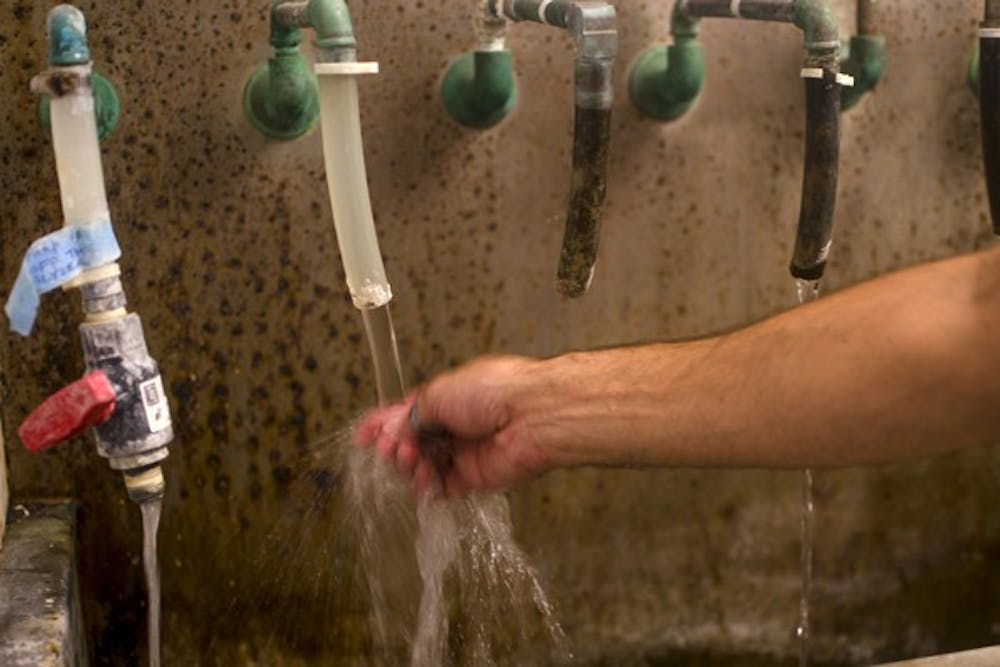 Drinkable water, ready to be tested for harmful substances, spews from a hose in the operator's lab at the Johnny G. Martinez plant in Tempe, one of two plants that supplys Tempe with safe tap water. (Photo by Ethan Fichtner)
Drinkable water, ready to be tested for harmful substances, spews from a hose in the operator's lab at the Johnny G. Martinez plant in Tempe, one of two plants that supplys Tempe with safe tap water. (Photo by Ethan Fichtner)Every year as the temperature cools, Tempe’s tap water smells and tastes musky due to algae in reservoirs supplying the city, causing concern among some residents, but the “water continues to be safe to drink."
Craig Caggiano, a water utilities coordinator for Tempe, said the distinct taste at this time of year is due to one thing: “It’s algae growing.”
Algae are to blame for the poor taste in water during the fall months. As the weather cools, these algae, often present in the surface water of warmer climates, die off and leave “odor-causing compounds,” according to the Tempe government information website.
“While these algae byproducts can affect the smell and taste of drinking water, they have no adverse health effects,” according to the site.
To remove this byproduct, Tempe’s water treatment facilities use powder-activated carbon to sink the algae byproduct so it can be filtered out. Using powder-activated carbon is a “completely optional, completely aesthetic treatment,” Caggiano said.
The Tempe City Council has requested this extra step in processing the water, because it wants the best-tasting water possible, he said.
Although this step in treatment has nothing to do with the drinkability of water, Caggiano thinks it “makes a difference in public perception.”
“Above meeting all the standards, our city council says, 'Do what you got to do to make it taste as good as you can,'” Caggiano said.
Tempe City Councilmember Kolby Granville knows the water tastes weird, but during his two years serving on the council, he has “never gotten a single email about the taste of the water.”
Granville agreed the taste could be improved, but as the city climbs out of the recession, the palatability of tap water is low on the priority list in comparison to issues such as park management, road improvement or paying city employees.
“Something that’s a nice to have, but not a need to have, doesn’t really make that list,” Granville said.
Businesses and students have noticed Tempe's water has a unique flavor.
Four Peaks Brewery, a popular craft brewery in Tempe, uses reverse-osmosis to filter impurities out of the city water before creating its beer, Bret Blanchard, a brewer for Four Peaks, said. Blanchard acknowledged that employees often times fill up water jugs at the brewery so they can have better water to drink at home.
Communications senior Eddie Ochoa, who moved from Payson to Tempe five years ago for college, said he prefers buying jugs of water instead of drinking from the tap, because the water in Tempe “makes your mouth dry.”
Electrical engineering freshman Jeremiah Navarro said he uses ice in his tap water to suppress the somewhat unfavorable taste.
Mechanical engineering sophomore Aidan Schermerhorn said he gets a strong scent of chlorine from the water out of tap at his apartment in Tempe.
“I’d just leave my water jug to sit out overnight and the chlorine would evaporate …and it was way better tasting,” he said.
Reach the reporter at efichtne@asu.edu or follow him on Twitter @EthanMFich
Like The State Press on Facebook and follow @statepress on Twitter.




